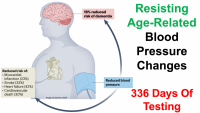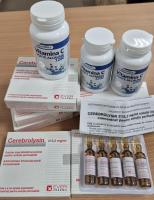Health
 Last Updated:
08 June 2025 - 03:17 PM
Last Updated:
08 June 2025 - 03:17 PM
Resisting Age-Related Blood Pressure Changes: 336 Days Of Testing 08 June 2025 - 11:04 AM
Ketones protect the brain and prevent age-related damage 04 June 2025 - 08:55 AM
https://www.pnas.org/doi/10.1073/pnas.2416433122
Brain aging shows nonlinear transitions, suggesting a midlife “critical window” for metabolic intervention
Age-related cognitive decline is associated with metabolic, vascular, and inflammatory changes, making it challenging to distinguish primary causes from secondary (downstream) effects. This study demonstrates that brain aging follows a specific progression, with the first stage occurring in middle age and coinciding with increased insulin resistance. Moreover, we show that brain areas that age fastest are also those most vulnerable to neuronal insulin resistance. Importantly, we find that administering ketones, which can fuel neurons while bypassing insulin resistance, reverses brain aging effects. However, this intervention is only effective when provided early enough for neurons to remain viable. These findings contribute to our understanding of brain aging mechanisms and suggest neurometabolic strategies for targeted early intervention in preventing age-related cognitive decline.
Abstract
Understanding the key drivers of brain aging is essential for effective prevention and treatment of neurodegenerative diseases. Here, we integrate human brain and physiological data to investigate underlying mechanisms. Functional MRI analyses across four large datasets (totaling 19,300 participants) show that brain networks not only destabilize throughout the lifetime but do so along a nonlinear trajectory, with consistent temporal “landmarks” of brain aging starting in midlife (40s). Comparison of metabolic, vascular, and inflammatory biomarkers implicate dysregulated glucose homeostasis as the driver mechanism for these transitions. Correlation between the brain’s regionally heterogeneous patterns of aging and gene expression further supports these findings, selectively implicating GLUT4 (insulin-dependent glucose transporter) and APOE (lipid transport protein). Notably, MCT2 (a neuronal, but not glial, ketone transporter) emerges as a potential counteracting factor by facilitating neurons’ energy uptake independently of insulin. Consistent with these results, an interventional study of 101 participants shows that ketones exhibit robust effects in restabilizing brain networks, maximized from ages 40 to 60, suggesting a midlife “critical window” for early metabolic intervention.
One problem with this is that they used pure ( R )-3-hydroxybutyl-( R )-3-hydroxybutyrate monoester (ΔG ketone monoester, HVMN Inc., Miami, FL) dosed at 395 mg per kg of body weight and diluted with water (volume ratio 1:1.6).
This is important because if you tried to take that dose of any of the available Beta-Hydroxybutyrate (BHB) salts, it would result in a highly toxic if not fatal dose of potassium and possibly magnesium, and at least a very excessive dose of calcium or sodium. The monoester avoids this, but it's very very expensive (about $30 per dose from what I could find).
On the other hand, I found a Japanese supplier of the acid which may require refrigeration but has no metal in the compound. They sell only wholesale, so a group buy may be a possibility. It will still probably not be at all cheap.
Or we can always just do a keto diet.
Anti Cancer Stack including Myers Cocktails IM and Vitamin B17 (Amygdaline) 03 June 2025 - 06:32 AM
1. Myers Cocktail IM - 10 ml 3 times / week
2. CITOPRIM ONCOLOGY STEM - 3 caps daily
3. Amygdaline (Vitamin B17) - 3 to 5 caps daily
4. ONCO DETOX - SOD Natural ( 2 ampoules daily)
5. Ringer Solution IV
source: gerovitalcosmetic.com
if calcium alpha ketoglutarate is such a good supplement why is it so hard to find? 30 May 2025 - 04:37 PM
There are only a handful of places to get it, and some of them have suspicious "lab reports."
It's a in a couple products, like Novos and Bryan Johnson's.
Cerebrolysin 5ml + Vitamin C Alkaline 1200mg 29 May 2025 - 06:57 AM
I just unboxed my new order.
2 user(s) are viewing this feed (in the past 15 minutes)
0 members, 2 guests, 0 anonymous users































